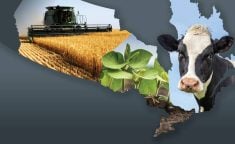Canada’s dairy industry is asking for provinces to oversee a code of practice for grocery retailers.
In a letter to federal ministers, leaders from dairy groups say the “best solution” to “arbitrary fees and deductions” would be through “the development of provincial codes that are legislated, mandatory and enforceable.”
The country’s top grocery retailers drew fire from food suppliers in 2020 after raising fees, or introducing new ones.
By November the governing Liberals had created a working group to study the issue and find potential solutions.
Read Also

Mazergroup’s Bob Mazer dies
Mazergroup’s Bob Mazer, who helped grow his family’s company into a string of farm equipment dealerships and the main dealer for New Holland machinery in Saskatchewan and Manitoba, died July 6 from cancer.
“Retailer demands of suppliers increase the cost of getting products to consumers and, for Canada’s dairy sector, undermine the principles which support the efficiency of Canada’s supply management system,” said the letter from dairy reps. “The arbitrary fees paid to retailers is money that is not being reinvested in dairy operations, in employees and their communities, or in product innovations that consumers want.”
The authors warned high costs of doing business with major retailers can limit smaller suppliers’ ability to get products to market, and argued the root of the problem is a “chronic underinvestment” in processing capacity.
A mandatory code of conduct, either through regulations or law, outlining rights and obligations of all parties, is the request of the letter writers. Consequences for non-compliance, enforced by a specialized body, is also called for.
The dairy industry wants the federal government develop a framework for provinces to base codes on, to ensure rules are “fully harmonized” across the country.
(Already the federal government had made it clear the role of regulating deals between supermarkets and suppliers was outside its jurisdiction.)
“We are convinced that this is the only way to restore fairness and balance in Canada’s food supply, for the benefit of the entire value chain, from the farm to the fork,” the letter says.
Signees included representatives from the Dairy Processors Association of Canada, Dairy Farmers of Canada, the Ontario Dairy Council, the BC Milk Marketing Board and others.
In May, Canada’s largest food retailers made calls for an industry code of conduct – joining the long-standing call from producers and manufacturers. At the time, at least some of those retailers favoured a government-led approach to designing a code of practice.
Now the retailer’s alliance is asking for the rules to “be developed by industry for industry.”
Launched in November 2020, the provincial-federal working group made up of agricultural ministers are continuing to study the relationship between supplier fees.
Minister of Agriculture Marie-Claude Bibeau is chairing that group. When first launched, she told reporters fees imposed by retailers “are really worrying.”
A report of recommendations on how to fix broken relations between producers and retailers is expected in July.




















